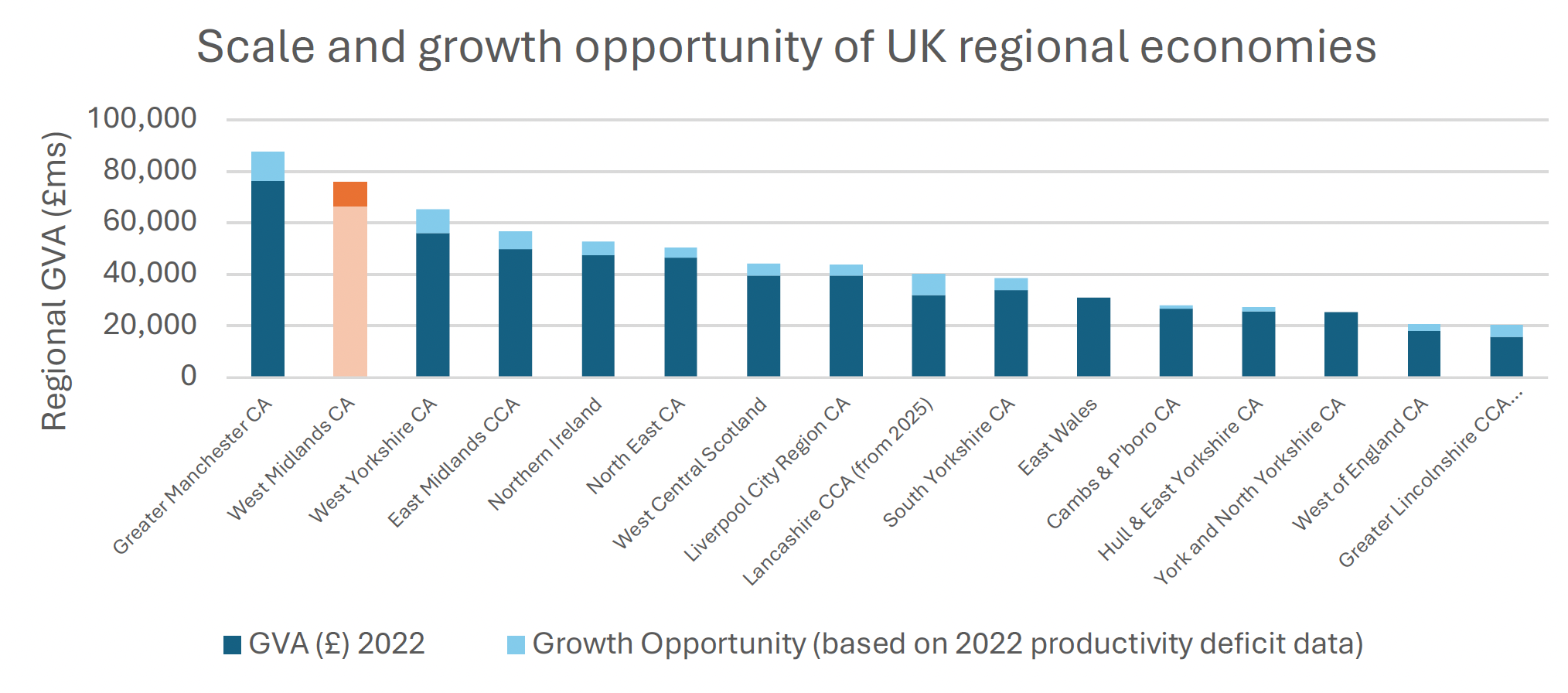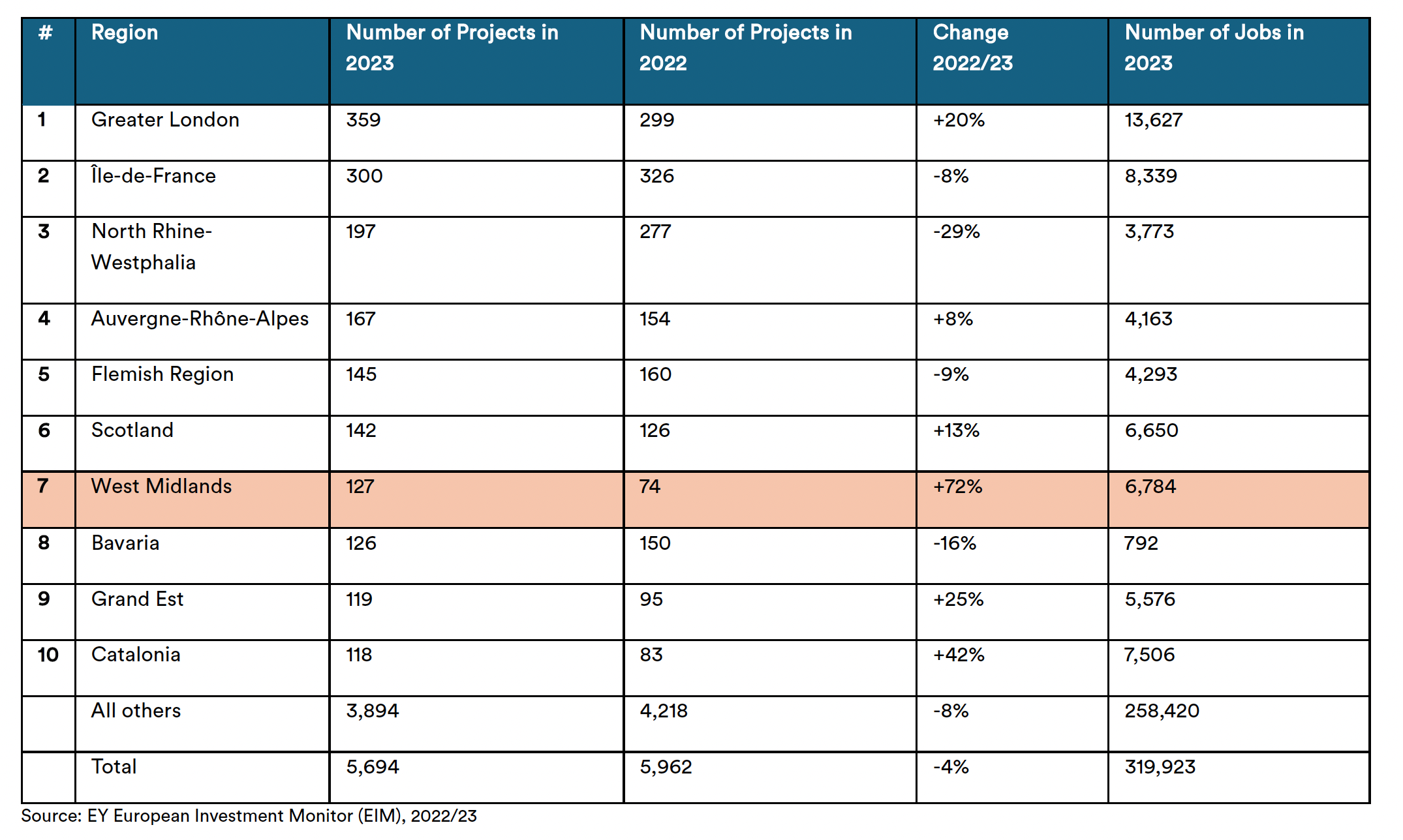Our economic opportunity and foundations for growth
Our economic opportunity and foundations for growth
Our scale
There is no route to a more productive and prosperous UK that doesn’t include the West Midlands making a bigger contribution to national growth. At £77 billion, the West Midlands represents about 3.5% of the national economy, is almost double the size of Oxford and Cambridge and is home to world-leading innovation clusters. Making our economy as productive as the UK average would deliver a £12 billion boost to the regional and UK economy, the largest growth dividend of any city-region.

Figure 1: Bar Chart showing scale and growth opportunity of UK combined authority and other city-regional economies that have lower levels of productivity
Our young and diverse demography
The West Midlands is both the most populous and youngest city region outside London, with a median age of 36.6 years, a third of the people under the age of 25 and nearly a quarter under 18. As one of very few city-regions where a young and diverse population is expected to grow in the coming decade, our long-term growth - and that of the UK - will be activated by the ingenuity and skill of our young people working in more productive businesses.
Our connectivity
Our economic geography is an asset. Sitting at the centre of the nation - 90% of all people and businesses live within a 4-hour journey of England’s beating heart - success in the West Midlands comes from wringing full value from the major UK investment in HS2. Birmingham is a resurgent core city, our engine for growth and agglomeration, complemented by Solihull, home to the airport, the NEC and the new HS2 interchange station. Wolverhampton and the wider Black Country are our corridors for green innovation with unrivalled transport connectivity to the UK’s second city, while Coventry and its links into Warwickshire benefit from deep knowledge capital and highly- value manufacturing. As commuting patterns and supply chains evolve, the West Midlands has the “goldilocks” geography to combine scale, resilience and quality of life.
Our investment and innovation records
The West Midlands is also in the top 10 of investment hubs in Europe. After significant investment in Foreign Direct Investment (FDI) and trade services linked to the Birmingham 2022 Commonwealth Games, 127 global"
"businesses had the confidence to invest in 2023, placing the West Midlands above Bavaria and Catalonia and making it the second biggest and fastest growing region for FDI in England. We are recognised by the EU as only one of two regional innovation valleys in the UK and were one of three finalists in the European Capital of Innovation Awards 2024 and have the highest ratio for leveraging private sector investment in research and development.

Figure 2: Table showing top 10 European regions by number of new FDI projects (2023)
With unprecedented international turbulence in global trade, the UK is viewed positively for its stability. Allied to this, the West Midlands’ cohesion and ambition doesn’t just build a compelling offer for investors now but our Growth Plan will set the terms for a long-term relationship where we will work with agility and pragmatism across civic institutions, universities, colleges, business clusters and Government departments to address the twists and turns of global change. Our priority on business leadership and investment below explains further how we will capitalise on being the first region to develop a joint International Strategy with central Government to drive future inward investment.
This West Midlands Growth Plan, backed by the of Government’s English Devolution White Paper and the West Midlands’ first Integrated Settlement, represents a milestone in the long-term rejuvenation of the region. Perhaps more so than most English regions, our economic fortunes have suffered from central government decisions. In the 1950s and 60s, government legislation intentionally curtailed Birmingham’s growth; in the last decades of the twentieth century deindustrialisation sapped our strength; and even in recent years, the West Midlands has struggled more than most to return to levels of productivity seen before the financial crisis and pandemic. Without change our economy will continue to flatline.
For our residents, the consequences of this are clear: our people live shorter lives, spend more of those years in poor health, and struggle to gain the skills and qualifications they 8 need to achieve their full potential. Meanwhile, our great cities that were home to the industrial revolution do not have the physical infrastructure and social amenities our businesses and investors rightly expect.
But the foundations for growth – our scale, our demography, our investment and innovation records and our connectivity – in the West Midlands are all present. Far from being a limitation, the make-up of our regional economy – our industrial composition – is a source of strength. We are one of only two regions where Government has recognised our sector strengths across all eight priorities of the modern Industrial Strategy and our business clusters are global leaders in the products and services that will define the 21st century. They sit at the interface between traditional industrial sectors like manufacturing and logistics and emerging new technologies and tradable services.
The West Midlands Theory of Growth
Building on these foundations, we have developed a West Midlands Theory of Growth— based on our emerging evidence base—which sets out 12 bold propositions concerning what we believe will be the key components to reawaken regional productivity and realise the West Midlands’ full economic potential. While we face similar challenges and opportunities to other regions and can learn lessons from those, our Theory of Growth is specific to our region and tailored to our vision of inclusive growth. And it is designed to be tested: our theory is the basis for action-learning so that as we develop and implement new programmes to promote growth in the region, we can better understand what is working, and what isn’t. Our Theory of Growth is summarised in Annex 1 and can be read in full online.
Questions
1) Do you agree that our scale, demography, connectivity and investment and innovation records represent the foundations for economic growth in the West Midlands?
